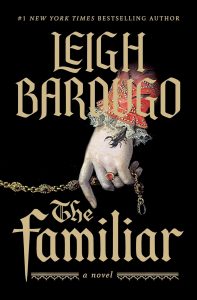Alexandra Pierce Reviews The Familiar by Leigh Bardugo
 The Familiar, Leigh Bardugo (Flatiron Books 978-1-25088-425-1, 400pp, $29.99 hc) April 2024. Cover by Jim Tierney & Emma Pidsley.
The Familiar, Leigh Bardugo (Flatiron Books 978-1-25088-425-1, 400pp, $29.99 hc) April 2024. Cover by Jim Tierney & Emma Pidsley.
Spain in the 1500s was not a great place to be if your family were converso – a term applied to Jews or Muslims who had been (often forcefully) converted to Catholicism – and worse still if you were caught secretly practicing your familial faith: It was the time of the Inquisition, which sought to rid Spain of ‘‘evil influences.’’ Such influences included variations on Christianity, Judaism, and Islam; and also witchcraft. For Luzia, living in Madrid in the late 16th century, the Inquisition is an ever-present shadow: she is an orphan, a conversa – and she possesses magical ability.
Luzia’s life had previously been straightforward: a servant in a mediocre household for years, sleeping in the cellar, she has no expectations of life improving. However, her world begins to change when the mistress of the house, Doña Valentina, discovers her magic. She commands Luzia to perform for guests and soon, powerful people in Madrid learn of her abilities; in particular, word reaches the ear of the wealthy and ambitious Victor de Paredes, who also happens to be the patron of Luzia’s aunt. To further his own ambitions, Victor enlists Luzia as his representative in a competition to find a magical champion for the king – a competition full of hazards, since the Inquisition will be assessing whether the magic comes from God or the devil. Luzia’s preparation is largely guided by Victor’s assistant, or ‘‘familiar,’’ the mysterious Santángel. He and Luzia have an initially antagonistic relationship, which then develops into something more romantic. (Note: This is not a book for readers who object to significant age gaps in romantic relationships.)
The story is told largely but not exclusively from Luzia’s perspective; the reader also sees the world from Doña Valentina’s perspective, and that of Santángel. All three of these characters are trapped, in different ways. Luzia is poor and female, and terrified of her family heritage being found out. Valentina has some wealth but not enough to meet social expectations; she is a woman, and trapped in a loveless marriage. The bindings on Santángel are more esoteric, and are revealed gradually as the story progresses; he has more power than either of the women but is nonetheless trapped as surely as they are. How to live within such social cages, the compromises that can or must be made – and how traps might be thwarted – is a significant theme throughout the novel.
Leigh Bardugo wonderfully evokes 16th-century Spain with all its glamour and its horror, the vying for power at all levels, and the consequences of the extraordinary and terrible power of the Inquisition. She has created a vibrant world that is gradually revealed through Luzia’s experiences: as she progresses from small tricks – like un-burning bread – to greater ones, like causing a seed to germinate and grow, Luzia’s horizons expand from one insignificant house in Madrid to the courts of Spain’s most powerful people. It’s also a finely paced novel. Bardugo takes the time to explore the different histories and pain of Luzia and Doña Valentina – they are an important aspect of the story – but there’s a sense of inexorable movement: These women have been caught up in the plans of other, more powerful people, and their stories are being moved along whether they like it or not.
One small quibble I have is with the title: It is Santángel who is ‘‘the familiar.’’ While he is a significant character, it’s Luzia who is central, and she never takes up a position that is in any way like Santángel’s. Perhaps Bardugo is trying to make a point about the similarities and differences between Luzia and Santángel; if so, it didn’t quite work for me, so the story feels mistitled.
The Familiar is the first Leigh Bardugo novel I have read. If this is indicative of her ability to create characters, chart consequences, and evoke worlds, I shall certainly be seeking out more works by her.
This review and more like it in the June 2024 issue of Locus.
 While you are here, please take a moment to support Locus with a one-time or recurring donation. We rely on reader donations to keep the magazine and site going, and would like to keep the site paywall free, but WE NEED YOUR FINANCIAL SUPPORT to continue quality coverage of the science fiction and fantasy field.
While you are here, please take a moment to support Locus with a one-time or recurring donation. We rely on reader donations to keep the magazine and site going, and would like to keep the site paywall free, but WE NEED YOUR FINANCIAL SUPPORT to continue quality coverage of the science fiction and fantasy field.
©Locus Magazine. Copyrighted material may not be republished without permission of LSFF.






